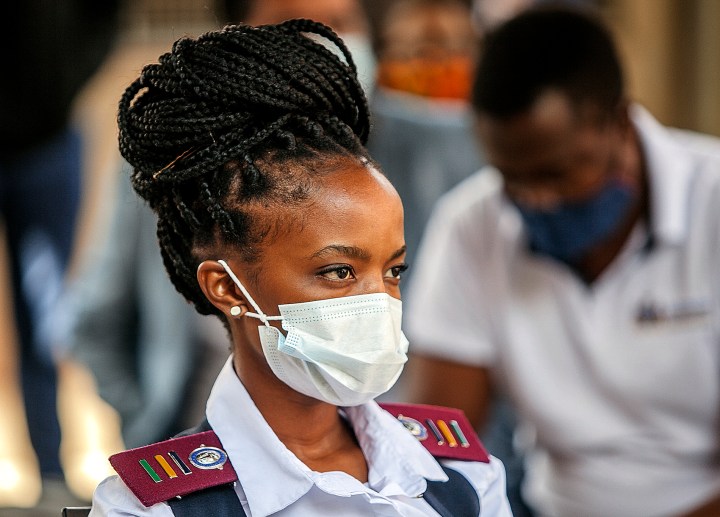SPOTLIGHT
Reflections on the future of nursing in South Africa

The Rural Health Advocacy Project recently hosted an online webinar focusing on social accountability in nursing education. Professor Laetitia Rispel, SA research chair on the Health Workforce at Wits, delivered the opening address on challenges facing the nursing profession. This is an edited extract.
In almost all countries of the world, the Covid-19 pandemic has caused untold hardship, suffering and devastation, laying bare pre-existing injustices and inequities, whether by geography, race or other forms of vulnerability, with poor people and poor nations bearing the brunt of the effects.
Concomitant with Covid-19, we are witnessing another silent pandemic. This one has been with us for a long time; one that no one talks much about — that of structural and systemic racism and racial injustice. The senseless and brutal killing of George Floyd at the hands of police in the US has been the proverbial straw that broke the camel’s back. Endemic and structural racism throughout the world is part of a deeper public health and human rights crisis that disproportionately affects people of colour, a term I dislike but use for lack of a better one.
It is a pandemic that consists of structures, systems and policies that create social and economic conditions that lead to health inequities, differential rates of death and disease, dehumanisation of people and violation of their human rights.
In South Africa, the Nelson Mandela Foundation has reminded us that 26 years of democracy have not yet ensured black lives matter as much as white lives. The foundation highlighted the ongoing structural violence against black lives constituted by patterns of poverty and inequality deeply rooted in our histories of colonialism and apartheid.
Superimposed on poverty and inequalities is the endemic gender-based violence that goes to the core of our humanity. In the past two weeks, 14 women and children have died in yet another cycle of gender-based violence, the brutal nature of which makes us feel sick to the core. We express our outrage and protest, and little seems to change in between Uyenene and Tshegofatso’s brutal murders, except that the brutality is more in our face.
I urge all of us to reflect on what we can do individually to make a difference, and collectively to ensure that women and children are safe and that they stay alive. It is easy to become despondent and ruminate only about the problems and obstacles. Nigerian novelist Chimamanda Adichie reminds us about the “danger” of a single story or a single narrative. She says there is nothing wrong with the single story. The problem arises when the single story becomes the only story.
In our context, social accountability is the obligation of nursing education institutions to direct their education, research and service activities towards addressing the priority health concerns of the community and/or country, identified jointly by a range of relevant stakeholders including the public at large.
Let me start by saying that there is not a single story or single narrative about South African nurses. They do have agency, they have power (even if they do not think so) and they exercise leadership in different spaces. Hence, I want to pay tribute to the thousands of nurses who make a difference to the lives of patients and communities and to the South African health system every day.
My tribute goes to the many nurses who are:
- Caring, compassionate and competent, working against the odds to provide the best possible care, especially in rural and other under-served areas.
- Role models, mentors, teachers and team-players.
- Leaders and trailblazers.
- Women’s rights and social justice advocates.
If you are a nurse, or any other type of healthcare worker, I am sure you could think of the names of people who come to mind in each of these categories. Please take the time to remember these nurses and to acknowledge them, even if silently. If you are a nurse yourself, I also encourage you to celebrate your own achievements in nursing and as a nurse, or as an advocate for nurses and nursing.
I mentioned that the Covid-19 pandemic has exposed the inequities and injustices of our society. In the case of the healthcare system, the pandemic has also accentuated the fragility and fault lines of the system.
So, how do we approach a discussion on social accountability in nursing education?
In our context, social accountability is the obligation of nursing education institutions to direct their education, research and service activities towards addressing the priority health concerns of the community and/or country, identified jointly by a range of relevant stakeholders including the public at large.
The State of the World’s Nursing Report calls for an investment in “the massive acceleration of nursing education” – educators, infrastructure and students – to address global needs, meet country demand and respond to changing technologies and advancing models of integrated health and social care. This investment is in addition to the creation of new nursing jobs, and strengthening of nurse leadership.
In South Africa’s public health sector, nurses constitute 56% of all healthcare providers, with different modelling exercises projecting both current and future shortages. There is no doubt that nurses are central to addressing the complex burden of disease, the primary healthcare (PHC) approach and improving health system performance. Notwithstanding this reality, South Africa lacks agreed-upon national staffing norms and nursing curriculum changes have been slow, and remain largely unresponsive to population and health system needs.
There is insufficient investment and/or prioritisation of nursing education reforms. The discourse on social accountability remains largely focused on medical education. The proposed nursing education reforms based on the 2013 Framework for Nursing Qualifications remain contested. There is insufficient stewardship of the transformation process, and the scope of practice regulations were only released on 12 May 2020, in the middle of the lockdown, with one month for inputs.
It is difficult to see the alignment between the scope of practice regulations, and nursing education reforms, and the proposed National Health Insurance system (NHI). Of course, nursing education cannot be seen in isolation of working conditions, positive practice environments, the necessary resources and supportive people management and leadership.
So, what are the possible actions for nurses’ representative organisations, individual nurses and health activists?
Education also involves advocacy for women’s rights, for human rights, for equity and social justice in ensuring access to quality care for those most vulnerable in society – poor people, rural communities, vulnerability on the basis of illness or disease, citizenship, and “the other”.
We all agree that nurses are central to universal health coverage and a comprehensive response to Covid-19. The International Year of the Nurse and Midwife provides an opportunity for valuing nurses and for sustainable investment in nursing. This suggests a broader discourse on, and demands for, social accountability in nursing education, which would make nursing education the business of the public and not just those in the corridors of power.
Socially accountable nursing education must instil in every young nurse and/or midwife the values and practice of responsive and respectful healthcare. We should emphasise the transformative potential of education and training – both in building the next generation of nurses and in making a difference.
Nursing education must ensure a balance between caring and compassion of nurses on the one hand, and clinical competence on the other. It is possible for every individual nurse to make a difference by providing safe, quality clinical care, and by striving to be responsive to the holistic needs of patients and communities.
Socially accountable nursing education must also encourage critical thinking and instil a passion and desire for lifelong learning. This means that every nurse should also take responsibility for their own learning, to maintain competence and to provide care to the highest standards of professional conduct based on ethical principles.
Socially accountable nursing education also involves the teaching of advocacy skills to overcome the structural and organisational problems which influence nurses’ ability to provide quality care, as well as teaching of the social determinants of health. As the majority of nurses are women, nurses should advocate against gender-based violence and highlight the linkages between women’s health and GBV, and the importance of ensuring that the rights of women are respected.
Education also involves advocacy for women’s rights, for human rights, for equity and social justice in ensuring access to quality care for those most vulnerable in society – poor people, rural communities, vulnerability on the basis of illness or disease, citizenship, and “the other”.
Finally, nursing education must emphasise the importance of teamwork and leadership in ensuring population health outcomes.
In conclusion, empowering and investing in nurses and nursing will have the additional benefits of accelerating progress towards the Sustainable Development Goals on health, quality education, gender equality and decent work and inclusive growth. DM/MC
Rispel is SA research chair on the Health Workforce at Wits University.
This article was first published in Spotlight.
"Information pertaining to Covid-19, vaccines, how to control the spread of the virus and potential treatments is ever-changing. Under the South African Disaster Management Act Regulation 11(5)(c) it is prohibited to publish information through any medium with the intention to deceive people on government measures to address COVID-19. We are therefore disabling the comment section on this article in order to protect both the commenting member and ourselves from potential liability. Should you have additional information that you think we should know, please email [email protected]"



 Become an Insider
Become an Insider